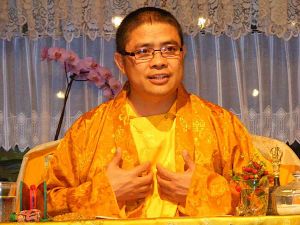Difference between revisions of "Avalokiteshvara’s Ten Prayers for happiness and well-being of all sentient beings chanted by Khenpo Pemo Choephel Rinpoche"
Jump to navigation
Jump to search
(Created page with "thumb ===10 Prayers in Tibetan (chanted version) Chinese and English=== ===JE LAMA NAMLA SOLWA DEB, GOE KADRIN CHENGYI JINGYI LOB===...") |
|||
| Line 118: | Line 118: | ||
[[Category:Buddhism]] | [[Category:Buddhism]] | ||
[[Category:Tibetan Buddhism]] | [[Category:Tibetan Buddhism]] | ||
| − | [[Category:Avalokiteshvara] | + | [[Category:Avalokiteshvara]] |
[[Category:Deities]] | [[Category:Deities]] | ||
[[Category:Mantras]] | [[Category:Mantras]] | ||
[[https://buddhaweekly.com/avalokiteshvaras-ten-prayers-for-happiness-and-well-being-of-all-sentient-beings-chanted-by-khenpo-pemo-choephel-rinpoche/]] | [[https://buddhaweekly.com/avalokiteshvaras-ten-prayers-for-happiness-and-well-being-of-all-sentient-beings-chanted-by-khenpo-pemo-choephel-rinpoche/]] | ||
Latest revision as of 19:47, 3 February 2022
10 Prayers in Tibetan (chanted version) Chinese and English
JE LAMA NAMLA SOLWA DEB, GOE KADRIN CHENGYI JINGYI LOB
祈请至尊上师众们,尤其具恩者祈加持
To the assembly of spiritual masters, I beseech with gratitude – please grant blessings
DIR TSOKPEI KALDEN PHOMO NAM, WANG CHOEDHI DONDANG DENPAR ZHU
聚于此具缘男女众,此灌顶法有义祈请行
Fortunate men and women gathered here, please receive these precious Empowerments and Teachings
OM MANI PADME HUM HRI OM MANI PADME HUM
DENG JALWI TSENDEN LAMA DI, JE SANGYEY YERMED CHIWOR GOM
现拜谒具德上师此,顶上观本尊佛无二
Having met the assembly of Gurus here, visualize above your head – whom in essence is Buddha himself
LHA THUKJE CHENPO CHIWOR GOM, GNAG YIGEY DRUKMEI SOLDEB ZOD
顶上观大悲观音尊,语六字真言请念诵
The great compassionate Avalokiteshvara, beseech and chant:
OM MANI PADME HUM HRI OM MANI PADME HUM
SEM JAMDANG NYINGJE CHENPO GOM, CHOE JETSED DROWEI DONDU ZOD
意大慈大悲请修持,所修法利众请实行
Practise great love and compassion, practise for the benefit of all sentient beings
JIG GEYDANG NEDDON GANGJUNG YANG, JIG KYOBKYI YIGEY DRUKMA YANG
八畏病魔产生何亦,救怙怖畏六字明音
Whatever eight fears, diseases and evil obstacles, can be pacified by reciting these six syllables:
OM MANI PADME HUM HRI OM MANI PADME HUM
LUE MITAK PANI NGONSUM LA, YONG KHORWA DILA NYINGPO MED
身为无常者乃现量,此一切轮回无意义
Our bodies are impermanent, there is no essence in samsara
CHOE GEWA CHUPO DRUPA DANG, DIG MIGEY CHUPO PANGWAR JA
Practice the ten positive deeds, and abandon the ten negative deeds
===OM MANI PADME HUM HRI OM MANI PADME HUM
===DE TARDU ZEDPI PHENYON GYI, TSE DIDANG CHIMA DELEK JUNG
以如是修行之诸利益,此世及后世吉祥生
The benefits of practising accordingly, will bring happiness and well-being in this and future lives
CHIR GYALKHAM YONGLA TRASHI SHOG, GOE DIRTSOK THROMLA TRASHI SHOK
总国土一切愿吉祥,尤聚此会众愿吉祥
May all be auspiciousness in this world, and may auspiciousness come to all gathered here
OM MANI PADME HUM HRI OM MANI PADME HUM
Mini Biography Venerable Pemo Rinpoche
From the Palyul Centre website:
Ven. Khen Rinpoche Pema Chophel (Pema Rinpoche) joined Palyul Monastery at the age of eight at his own will. He took his vows of refuge from His Holiness Penor Rinpoche and received from him the Palyul traditional practice of Ngondro, Tsa Lung and Dzogchen from the Namcho Cycle.
Source
[[1]]
